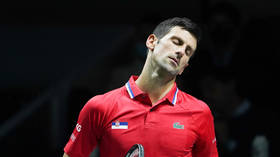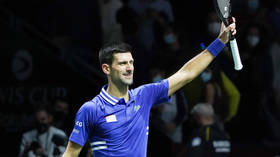Novak Djokovic released – but here’s why he could still be kicked out of Australia

Novak Djokovic has won his appeal against the Australian authorities’ decision to cancel his visa, although the Serbian tennis star may not be home and dry just yet as he attempts to remain in Melbourne.
In a case which played out amid intense international scrutiny, a judge at a Melbourne Federal Circuit Court ruled on Monday that Djokovic must be freed immediately from his detention at an immigration facility in the city.
Announcing the decision, Judge Anthony Kelly described the Australian government’s behavior in revoking Djokovic’s visa as “unreasonable”.
The 34-year-old had arrived in the country last Wednesday believing he had a medical exemption from vaccination which allowed him to enter.
Djokovic had recovered from a Covid-19 infection in December and had been granted permission to play at this month’s Australian Open by both Tennis Australia and the Victorian state authorities.
However, the Australian border authorities did not deem Djokovic to have sufficient grounds to enter the country with a medical exemption after it was confirmed that the Serbian had not been vaccinated against Covid.
They detained Djokovic, who in turn launched his appeal against the decision to cancel his visa and deport him.
On Monday, Judge Kelly crucially found that Djokovic had not been given sufficient time to discuss the situation with legal officials and his team after being told his visa would be canceled in the hours following his arrival in the country.
Kelly ordered the Australian authorities to release Djokovic within 30 minutes of the ruling, also telling them to return the tennis star’s passport and personal items, as well as pay his legal costs.
The ruling was greeted as a victory by Djokovic’s overjoyed supporters, some of whom had gathered in recent days outside the Melbourne detention center where he was being held.
Djokovic himself had been allowed to leave his confinement and follow the legal proceedings at the offices of his lawyers.
However, there were warning signs during Monday’s ruling which mean that Djokovic could yet be prevented from his shot at a record 21st Grand Slam title later this month.
Ominously, government barrister Christopher Tan noted that Australian Immigration Minister Alex Hawke has the right to exercise “the personal power of cancelation” of Djokovic’s visa.
That means Hawke could essentially step in to overrule Monday’s decision.
Judge Kelly warned that the “stakes have now risen, rather than receded”, adding that if Hawke does intervene, that could mean Djokovic being barred from entering Australia for three years.
The case has become fiercely political, with Australian Prime Minister Scott Morrison weighing in throughout the saga.
After Djokovic had initially revealed that he was heading Down Under to defend his title after being granted a medical exemption to compete, Morrison warned the star that he would be “on the next plane home” if border officials were not satisfied that he had a right to enter the country.
That seemed to be Djokovic’s fate after his visa was canceled, with Morrison staunchly defending the Australian Border Force’s actions and asserting that “rules are rules”.
Monday’s ruling exposed much of the confusion surrounding Djokovic’s detention and leaves the Australian authorities open to embarrassing accusations of a lack of joined-up thinking in their immigration policy.
An intervention by Immigration Minister Hawke, however, would be seen a nuclear option given that it could entail barring Djokovic from Australia for three years – even if there are reports that the ban would not be triggered automatically.
Federal sources stressing a three-year ban from entering Australia will not be automatic if Djokovic is deported. The government has discretion to allow him back for next year's Aus Open even if he is kicked out this year
— Paul Sakkal (@paulsakkal) January 10, 2022
While many in the Serbian community in Australia and far beyond will rejoice at his release, the decision will further enrage those in the country who had been opposed to Djokovic’s participation, given his stance on Covid vaccination.
Australians have been subjected to some of the most stringent lockdown rules anywhere on the planet during the pandemic.
As the case drags on, world number one Djokovic still faces an anxious wait regarding his participation at the Australian Open, which runs at Melbourne Park from January 17 to 30, and where the Serb has won a record nine titles previously.













